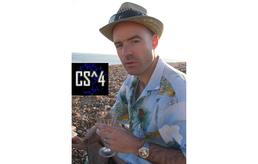Seminar 23rd June 2011 4 p.m. University of Southampton, Building 58 (Social Sciences) Room 1003
Thermodynamics, information, complexity: A conceptual triple point for understanding the evolution of the Earth system THURSDAY INSTEAD OF FRIDAY THIS WEEK
James Dyke
Max-Planck-Institut fur Biogeochemie, Germany
- Web page
- http://www.jamesdyke.info/
- Categories
- Complex Systems, Earth surface dynamics, Ecology, Evolution
- Submitter
- Petrina Butler
Complex Systems Simulation Seminar Series (CS^4)
from the Institute for Complex Systems Simulation, the Complexity in Real-World Contexts USRG, and the Computational Modelling Group.
PLEASE NOTE THIS WEEK'S SEMINAR IS ON THURSDAY INSTEAD OF FRIDAY.
Abstract
The Earth is arguably the most complex system in the known universe. We may tend to think of this complexity in terms of the abundant forms of life we see alive today and preserved in the fossil record. The modern evolutionary synthesis, has significant explanatory power with respect to this abundance. Indeed, as Dobzhansky claimed "nothing in biology makes sense except in the light of evolution". However, evolutionary theory may struggle to account for the observed changes in complexity of the biosphere, as evolution is characterised as a fundamentally directionless process.
In this talk I will argue that the self organisation of the Earth system and the increase in its order or structure or complexity is explicable in terms of non-equilibrium thermodynamics. The emergence and evolution of life on Earth has led to significant increases in rates of power generation. This has produced a cascade of energetic processes that includes trophic webs and much more. This is not to be understood as a physical law, but rather an understanding of thermodynamics in terms of probabilities and ultimately information. Consequently, when faced with Earth system challenges such as climate change or dwindling ecosystem services, we would do well to explicitly formulate our models in terms of what we know and what we suspect or believe. Rigorous inference techniques may not only be effective tools, but also reflect deeper insights into science and how we understand the natural word.
Speaker
James Dyke, Max-Planck-Institut fur Biogeochemie, Germany
Refreshments
Available from 3:30pm, lecture starts at 4pm.
Complex Systems Simulation Seminar Series
For the complete CS^4 schedule please click here: http://www.multidisciplinary.soton.ac.uk/cs4.html
Contact
Petrina Butler
Multidisciplinary Research Co-ordinator
University Strategic Research Groups
Research and Innovation Services
p.butler@soton.ac.uk
02380 593244
